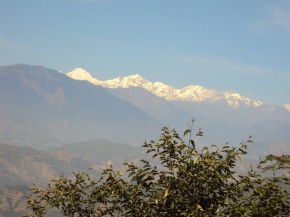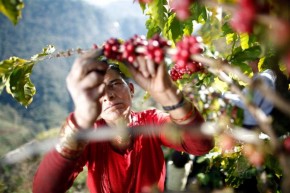
If you drive 35 kms northwest towards the hills from Kathmandu, the capital city, you might notice the fish farmers selling you fresh Japanese-introduced trout from the roadside restaurants and the jingle on the local radio station playing from the roadside shops. At some point, your cellphone will probably stop working, and you might notice how the two-lane road darkens as it slices into a canyon of trees on either side, and how your car shrinks, puttering at the foot of the giant, primeval forest. But if you keep going, eventually, you will arrive at Juretham. Juretham is where Alpine Coffee Estate is cultivating their first coffee plants on 1,000,000 sq. ft of land.
Kumud Singh and Rabindra Shrestha, owners of Alpine Coffee Estate, are having a very long day. There has been a delay in the construction of the water storage facility, which means no running water. This coincided, as luck would have it, with the harvest season when labour is almost impossible to find since everyone is busy farming their own land. The two have been scrambling to meet this deadline before the monsoon gathers force. And they have recently been informed that their bank has increased the interest rates on the oustanding amount while refusing their request for additional loans owing to an absence of sufficient fixed collateral. With both their houses already mortgaged with the bank, they have no option but to turn to moneylenders who are likely to charge them interest rates up to 36% p.a. for the loan.
DFID Nepal’s support for Small and Medium Enterprises
Economic growth in Nepal is painfully slow but we increasingly see opportunities where others see challenges. Alpine Coffee Estate is one such opportunity. However, faced with a deficit of funds amounting to USD 100,000 and having already invested all their savings and loans into the project, the company is close to folding without having launched any their products.

A component of DFID Nepal‘s ‘Improving Access to Finance for the Poor’ programme seeks to empower small and medium entrepreneurs, such as Kumud and Rabindra, by using competition and in-country networks to encourage innovation in providing jobs in poor communities. The programme will look for delivery models that are financially sustainable, efficient in providing basic goods and services to the poor, and capable of scaling up to address systemic challenges in public service delivery. Solutions will also require leveraging of capital from a number of public and private providers that encourage rather than inhibit innovation in service delivery.‘Improving Access to Finance for the Poor’, over a period of five years seeks to identify key economic opportunities and the inadequacies in the provision of financial services. It would then, through the formation of an SME Challenge Fund, ask private sector players to come up with solutions to these market failures. Target applicants would be financial institutions capable of providing the required financial services such as loans to small and medium enterprises based on their performance, without collateral if required, in specific geographies, or agricultural finance or finance combined with business development services.
‘Has the difficulty in access to financial services deterred you?’ I ask the young entrepreneurs at the end of another busy day. ‘A bit, but we’re hopeful change will happen. What's going to happen is, if you really love growing coffee, you'll be able to make a living doing something you love and hopefully, create some jobs along the way’.
Fixing me with one of his long stares, a grin frozen on his face, Kumud speaks as if he can see the future. And he likes it.

Recent Comments